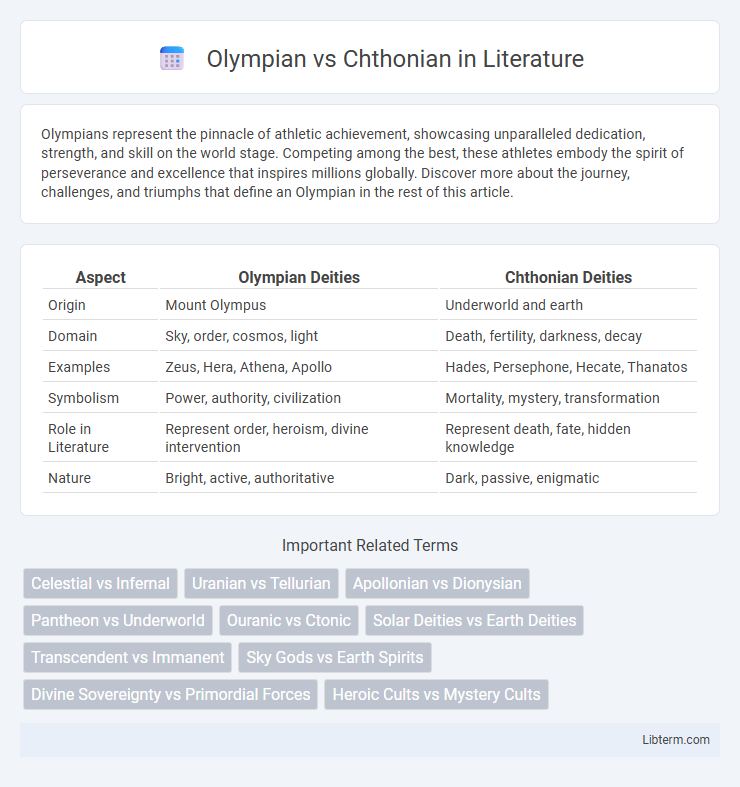Olympians represent the pinnacle of athletic achievement, showcasing unparalleled dedication, strength, and skill on the world stage. Competing among the best, these athletes embody the spirit of perseverance and excellence that inspires millions globally. Discover more about the journey, challenges, and triumphs that define an Olympian in the rest of this article.
Table of Comparison
| Aspect | Olympian Deities | Chthonian Deities |
|---|---|---|
| Origin | Mount Olympus | Underworld and earth |
| Domain | Sky, order, cosmos, light | Death, fertility, darkness, decay |
| Examples | Zeus, Hera, Athena, Apollo | Hades, Persephone, Hecate, Thanatos |
| Symbolism | Power, authority, civilization | Mortality, mystery, transformation |
| Role in Literature | Represent order, heroism, divine intervention | Represent death, fate, hidden knowledge |
| Nature | Bright, active, authoritative | Dark, passive, enigmatic |
Introduction to Olympian and Chthonian Deities
Olympian deities, residing on Mount Olympus, embody order, light, and the sky, symbolizing civilization and authority in Greek mythology. Chthonian deities, associated with the earth and underworld, represent fertility, death, and the primal forces beneath the surface. These two divine categories highlight the contrast between celestial power and subterranean mystery in ancient Greek religious beliefs.
Origins of Olympian and Chthonian Myths
Olympian myths originate from Mount Olympus, representing sky gods like Zeus, Hera, and Poseidon, embodying order, authority, and civilization in ancient Greek religion. Chthonian myths emerge from the underworld and earth, featuring deities such as Hades, Persephone, and Hecate, symbolizing death, fertility, and the mysterious powers beneath the surface. These mythological origins reflect a dual cosmology in Greek thought, contrasting the celestial governance of Olympians with the subterranean influence of Chthonians.
Key Characteristics of Olympian Gods
Olympian gods are characterized by their residence on Mount Olympus, embodying order, light, and civilization, often depicted as immortal, powerful, and anthropomorphic deities such as Zeus, Hera, and Athena. Their domains typically include the sky, wisdom, war, and fertility, representing human ideals and cosmic rule. In contrast, Chthonian gods are associated with the earth, the underworld, and primal forces, embodying death, fertility, and mystery.
Defining Traits of Chthonian Deities
Chthonian deities are characterized by their association with the underworld, earth, and fertility, often embodying elemental forces of death and rebirth. Unlike Olympian gods who represent order and civilization, Chthonians govern aspects of nature's darker, hidden realms such as the chthonic cycle of decay and regeneration. These deities are typically linked to subterranean environments, agriculture, and rituals involving the dead, emphasizing their integral role in life's continual transformation.
Role of Olympian Gods in Greek Religion
Olympian gods, residing atop Mount Olympus, functioned as principal deities governing key aspects of life, nature, and human affairs within Greek religion. They embodied order, civilization, and justice, influencing domains such as wisdom (Athena), warfare (Ares), and the sea (Poseidon). Unlike the more primordial, earth-bound Chthonian gods associated with the underworld and fertility, Olympians symbolized divine authority and societal norms upheld through worship and ritual in ancient Greek culture.
Chthonian Deities and the Underworld
Chthonian deities, often associated with the Greek Underworld, represent primal earth gods like Hades, Persephone, and Hecate who govern death, the afterlife, and subterranean realms. These gods contrast with the Olympian pantheon, ruling over the sky and mortal affairs, embodying celestial and heroic aspects. The Underworld, a dark and mysterious domain, serves as the realm of chthonian powers, overseeing souls' journey and the natural cycles of life and death.
Rituals and Worship: Olympian vs Chthonian
Olympian rituals emphasized public ceremonies, sacrifices, and festivals held in grand temples dedicated to gods like Zeus, Hera, and Apollo, focusing on sky deities and cosmic order. Chthonian worship involved secretive rites, offerings to underworld gods such as Hades and Persephone, and chthonic symbols representing death, rebirth, and the earth's fertility. These contrasting practices highlight the Olympians' association with light and order, whereas Chthonians embody mystery, the afterlife, and subterranean power.
Symbolism and Representation in Art
Olympian deities symbolize order, harmony, and celestial authority, often depicted in art with radiant light, regal posture, and elevated settings like Mount Olympus. Chthonian gods represent earth, death, and the underworld, portrayed through darker tones, subterranean motifs, and somber expressions reflecting their connection to the unseen and the afterlife. Symbolism in artistic representation emphasizes their contrasting domains: Olympians embody transcendence and divine governance, while Chthonians evoke mystery, decay, and the primal forces of nature.
Major Myths: Olympian and Chthonian Interactions
Olympian gods, such as Zeus, Hera, and Athena, often clashed with Chthonian deities like Hades and Persephone, revealing complex dynamics in mythological narratives. Major myths depict Olympians asserting divine authority over the heavens and earth, while Chthonians preside over the underworld, creating tension manifested in stories like the abduction of Persephone and the Titanomachy. These interactions symbolize the balance between life, death, and cosmic order in ancient Greek religion.
Influence on Modern Culture and Thought
Olympian deities, embodying order, justice, and celestial authority, have profoundly shaped Western cultural archetypes of heroism, governance, and morality, influencing literature, art, and political philosophy throughout history. Chthonian gods, linked to the earth, underworld, and primal forces, inspire themes of mystery, transformation, and the subconscious in modern psychology, horror genres, and esoteric traditions. Together, these mythological frameworks enrich contemporary narratives by juxtaposing divine order against chaotic, hidden powers, reflecting complex human experiences and existential questions.
Olympian Infographic

 libterm.com
libterm.com